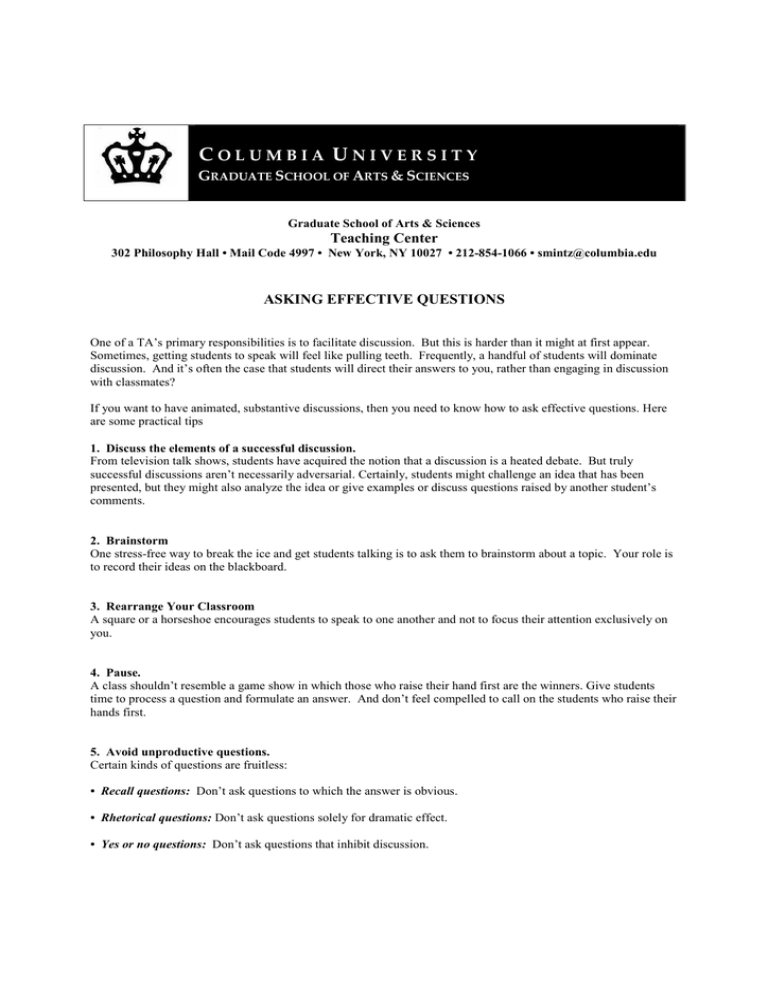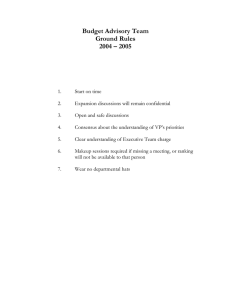asking effective questions
advertisement

COLUMBIA UNIVERSITY GRADUATE SCHOOL OF ARTS & SCIENCES Graduate School of Arts & Sciences Teaching Center 302 Philosophy Hall • Mail Code 4997 • New York, NY 10027 • 212-854-1066 • smintz@columbia.edu ASKING EFFECTIVE QUESTIONS One of a TA’s primary responsibilities is to facilitate discussion. But this is harder than it might at first appear. Sometimes, getting students to speak will feel like pulling teeth. Frequently, a handful of students will dominate discussion. And it’s often the case that students will direct their answers to you, rather than engaging in discussion with classmates? If you want to have animated, substantive discussions, then you need to know how to ask effective questions. Here are some practical tips 1. Discuss the elements of a successful discussion. From television talk shows, students have acquired the notion that a discussion is a heated debate. But truly successful discussions aren’t necessarily adversarial. Certainly, students might challenge an idea that has been presented, but they might also analyze the idea or give examples or discuss questions raised by another student’s comments. 2. Brainstorm One stress-free way to break the ice and get students talking is to ask them to brainstorm about a topic. Your role is to record their ideas on the blackboard. 3. Rearrange Your Classroom A square or a horseshoe encourages students to speak to one another and not to focus their attention exclusively on you. 4. Pause. A class shouldn’t resemble a game show in which those who raise their hand first are the winners. Give students time to process a question and formulate an answer. And don’t feel compelled to call on the students who raise their hands first. 5. Avoid unproductive questions. Certain kinds of questions are fruitless: • Recall questions: Don’t ask questions to which the answer is obvious. • Rhetorical questions: Don’t ask questions solely for dramatic effect. • Yes or no questions: Don’t ask questions that inhibit discussion. • Leading questions: Don’t ask questions that aren’t open-ended. • Guess What I’m Thinking questions: Don’t ask questions where you’ve already formulated the answer you want. 6. Ask the kinds of questions that stimulate discussion: Ineffective questions involve recall or simple agreement or disagreement. Effective questions, in contrast, are openended and involve higher-order thinking skills, such as analysis, interpretation, application, prediction, generalization, and evaluation. • Ask for students’ input: What should ___ have done? What would you do in this case? • Ask “how” and “why” questions: How might this argument be made more persuasive? Why do you think that ____ made this argument? • Ask evaluative questions: How compelling is ____’s argument? • Ask prediction questions: What will happen next? • Ask justification questions: What evidence led you to conclude that…? • Ask rationale questions: What is the reason…? • Ask generalization questions: What can you generalize…? • Ask students to bring their own questions to class. 7. Facilitate, don’t orchestrate Resist the temptation to respond to student comments yourself. And use the techniques that get discussions going: • Ask other students if they agree or disagree with the previous student’s comments. • Collect multiple responses to the same question. • Ask students to comment on a previous student’s comments. • Redirect a student’s question to the other students. 8. Encourage students to respond to one another. Require students to respond to the previous students comments before adding their own comments. For example, the students might challenge or question or analyze the previous comment or elaborate on it. 9. Give students the opportunity to lead a discussion. Your role might be to summarize the discussion before presenting your own thoughts. 10. Build in reflection. Occasionally, ask: “What did you learn from this discussion?” Jennifer Barton, Paul Heilker, and David Rutkowski, “Fostering Effective Classroom Discussions,” http://www.mhhe.com/socscience/english/tc/pt/discussion/discussion.htm
